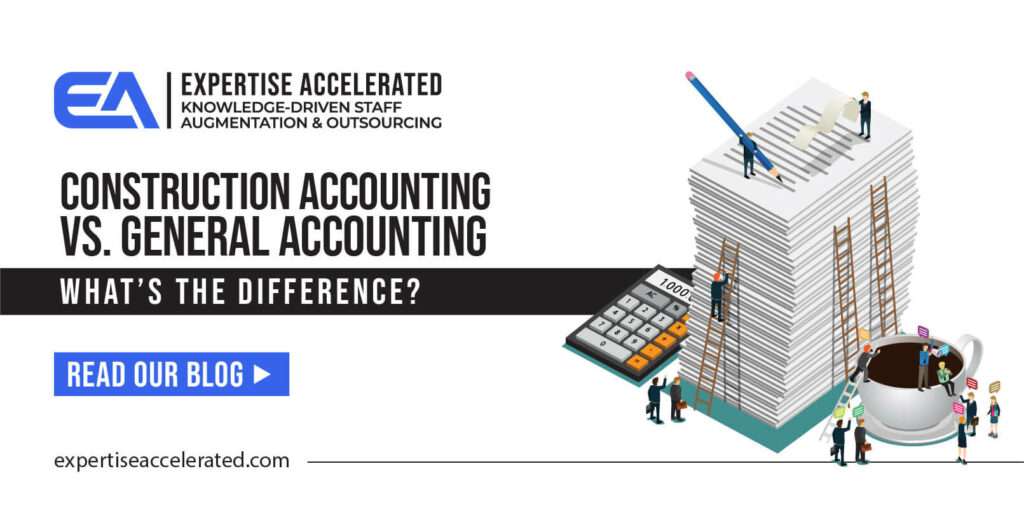Construction Accounting: Keeping Your Construction Business Profitable and Organized
Construction Accounting: Keeping Your Construction Business Profitable and Organized
Blog Article
Comprehending the Importance of Building Audit for Effective Job Administration

Function of Building And Construction Audit
Building and construction bookkeeping functions as the foundation of financial management in the construction industry, making certain that projects are completed within budget plan and economic goals are satisfied. construction accounting. This specialized accountancy approach addresses the unique challenges dealt with in building jobs, consisting of varying job durations, varying costs, and several stakeholders
One of the primary functions of building bookkeeping is to offer exact expense estimation and tracking throughout the task lifecycle. This assists in informed decision-making, making it possible for project managers to change resources and timelines efficiently. Additionally, building bookkeeping improves cash circulation management by keeping an eye on accounts receivable and payable, thus making sure that funds are offered for timely settlements to subcontractors and distributors.
It furnishes project managers with the needed monetary information to prepare thorough economic statements, which are necessary for audits and financial evaluations. Eventually, the function of building bookkeeping extends beyond plain economic tracking; it is important to critical planning and functional efficiency, driving the success of building and construction projects in a competitive landscape.
Secret Parts of Building Accounting

Budgeting establishes an economic structure that guides project implementation, allowing supervisors to allocate resources efficiently and anticipate prospective financial difficulties. Precise price monitoring is essential for surveillance expenditures in real-time, assisting to determine differences in between projected and actual expenses. This allows timely adjustments to keep the job on budget plan.
Additionally, economic reporting supplies stakeholders with a clear photo of the job's economic health. Regular records, such as profit and loss statements and cash flow evaluations, assist in educated decision-making and boost transparency amongst all parties included.
In addition, compliance with market policies and audit requirements is critical. This makes sure that economic techniques are not only reliable however likewise lawful, safeguarding the company versus legal effects. By incorporating these essential parts, construction audit promotes an organized method to taking care of financial resources, inevitably adding to the successful completion of construction tasks.
Benefits for Project Managers
Leveraging reliable construction accounting practices supplies project managers with a multitude of benefits that enhance both operational performance and monetary oversight. One substantial advantage is enhanced budget plan management. Exact monitoring of incomes and costs allows project managers to keep an eye on financial efficiency in genuine time, making certain jobs continue to be within budget and helping with timely modifications when needed.
Additionally, building accounting streamlines capital management, enabling job managers to expect monetary needs and optimize resource allocation. By comprehending cash inflows and outflows, they can better handle settlements to employees, subcontractors, and providers, thus staying clear of pricey hold-ups.
Additionally, durable audit systems supply extensive reporting abilities. Task supervisors can create reports that supply understandings right into project productivity, cost differences, and source application. This data-driven method cultivates informed decision-making, permitting managers to identify prospective problems proactively and implement restorative measures.
Lastly, adherence to construction bookkeeping standards guarantees conformity with regulatory and lawful demands, decreasing the risk of penalties or disagreements. Overall, reliable building accounting equips task managers with the tools essential to drive task success, improve stakeholder self-confidence, and promote long-lasting organizational development.
Usual Challenges in Building Accountancy
Numerous task supervisors come across substantial difficulties in construction accountancy that can hinder project success. One of the main difficulties check it out is the complexity of tracking several work sites, each with distinct spending plans, timelines, and resource allocations. This calls for careful focus to information, which can be overwhelming without a robust accounting system in position.
Furthermore, rising and fall product costs and labor rates can make complex budget plan management, making exact projecting hard. Job managers frequently have a hard time to fix up these costs with real expenses, resulting in potential economic inconsistencies.
Furthermore, building accountancy involves conformity with different regulations, consisting of tax commitments and labor legislations. Navigating these policies can be complicated, especially for supervisors who might not have a strong audit background.
An additional considerable the original source challenge is taking care of capital, which is vital in the construction sector. Delays in invoicing, repayments from clients, or unforeseen task modifications can develop money circulation shortages, endangering the project's development.
Last but not least, effective interaction in between job supervisors, accountants, and field groups is vital. check these guys out Misunderstandings can cause inaccurate monetary coverage, further complicating task management efforts. Attending to these obstacles proactively is vital for effective building and construction bookkeeping.

Best Practices for Effective Bookkeeping
While navigating the complexities of construction bookkeeping can be difficult, embracing best practices can considerably enhance financial management and task success. One basic method is maintaining precise and timely documents. Executing durable audit software program customized to building projects can enhance information access, invoicing, and coverage, conserving and decreasing mistakes time.
In addition, establishing a clear budget and routine surveillance versus this budget are critical. Utilizing a system of periodic monetary evaluations allows project managers to identify differences early, facilitating timely decision-making. It is additionally important to separate job costs right into straight and indirect classifications, enabling more clear understandings into profitability.
Another ideal technique involves promoting open interaction amongst all stakeholders. Normal updates and collective conversations about economic standing can make certain everyone is lined up and informed. Educating team in construction-specific accounting principles better boosts expertise and precision.
Lastly, making certain compliance with appropriate bookkeeping standards and guidelines is non-negotiable. Normal audits and internal evaluations add to transparency and responsibility, constructing trust with stakeholders and customers. By concentrating on these ideal practices, building companies can enhance their bookkeeping procedures, inevitably driving project success and monetary stability.
Final Thought
In final thought, building and construction accounting plays a crucial function in making sure effective project administration by helping with precise monetary oversight and improving decision-making. By incorporating crucial parts such as price estimate, cash money circulation management, and compliance, project supervisors can browse usual obstacles and utilize finest methods for efficient accountancy. Eventually, a robust building bookkeeping framework not only safeguards budget integrity yet additionally adds to the general economic health and wellness of building projects, fostering lasting success within the sector.
By integrating these vital parts, building bookkeeping fosters an organized strategy to handling monetary resources, inevitably contributing to the effective completion of building projects.
Accurate tracking of expenses and revenues permits project managers to monitor monetary efficiency in actual time, guaranteeing projects continue to be within budget and assisting in prompt changes when required.
Project supervisors can produce records that use understandings right into task productivity, expense variations, and resource utilization.Numerous job supervisors experience significant difficulties in construction bookkeeping that can prevent job success. construction accounting. Ultimately, a robust building and construction accounting structure not just safeguards budget honesty however also adds to the overall monetary health of construction jobs, cultivating lasting success within the industry
Report this page